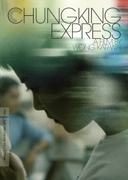 A nice article, written by a (fellow) Wong-Kar-Wai--enthusiast and professor of film David Bordwell, may be found here about Criterion's recent release of the filmmaker's Chungking Express (1994), my other Criterion holiday gift-to-self (other than Wes' great Bottle Rocket [1996; and soundtrack]). I've excerpted the relevant bits from the article below:
A nice article, written by a (fellow) Wong-Kar-Wai--enthusiast and professor of film David Bordwell, may be found here about Criterion's recent release of the filmmaker's Chungking Express (1994), my other Criterion holiday gift-to-self (other than Wes' great Bottle Rocket [1996; and soundtrack]). I've excerpted the relevant bits from the article below:
I probably don’t have to urge you to see the new Criterion edition of Chungking Express, out in both standard and Blu-ray editions. It’s the Miramax/ Rolling Thunder version, in a crisp transfer with a nice range of color and detail. (I don’t have Blu-ray and so can’t report on that disc.) There’s also a precious 1996 British TV episode in which WKW and a beer-guzzling Chris Doyle tour some Hong Kong locales we see in the movie, tossing out technical information along the way. The show also supplies a more or less documentary record of the Midnight Express fast-food counter a couple of years after the film. Still later, the success of Wong’s film led the owner to upgrade it, with results you can see at the end of this entry.
In the supplementary short, Chris Doyle catches himself talking like a critic and says it’s because “I’ve been reading Tony Rayns.” Not by chance, the Criterion set includes a superb commentary track by Tony, who has worked closely with Wong and Doyle for years. Tony’s fluent discussion anticipates practically every question you might ask about the movie, including why Faye Wong wears a United Airlines uniform.
Chungking Express is my favorite of Wong’s work, but that’s not the main reason I devoted a chapter to it in Planet Hong Kong. I think it’s an important film historically. In the context of Hong Kong cinema, it was as much a breakthrough as was Days of Being Wild, but its offhandedness made it seem more innocuous. Wong makes daring use of plot structure: two stories, barely linked, that connect thematically rather than causally. (We also examine this aspect in one section of Film Art.) Further, Chungking Express is an exhilarating instance of a type of storytelling that fascinates me, what I call “network narrative” and that I analyze in one essay in Poetics of Cinema. Finally, because this film was more widely seen than Wong’s earlier work, it identified him with a particular style: dazzlingly composed shots alternating with smeared and rushed ones, pulsations of saturated color, precise matching of image to music, and a tone of wistful romanticism. Who else could make such an engaging movie about two guys whose girlfriends have left them?
Across his career, Wong’s technique has been more varied than the flash-and-grab breeziness of Chungking Express, Fallen Angels, and Happy Together suggests. The blurred imagery and stuttering slow motion proved easy to mimic and even parody (in Wong Jing’s Whatever You Want, 1994). In the Mood for Love and 2046 returned to the more precise and controlled staging, the nearly abstract use of setting, and the tight close-ups of Wong’s earliest films. For all their virtues, though, these late movies lack the sheer ingratiating zest of Chungking Express. If My Blueberry Nights disappointed you (as it did me), revisit the original and watch it jump off the screen. Keep an eye peeled for those reflections.





No comments:
Post a Comment